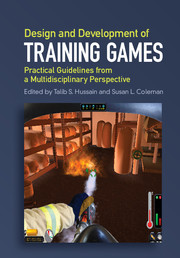Book contents
- Frontmatter
- Dedication
- Contents
- Contributors
- Acknowledgments
- Introduction
- Chapter 1 Learning Game Disciplines
- Chapter 2 Communication for Stronger Learning Game Design
- Chapter 3 Instructional and Gaming Elements
- Chapter 4 Story for Learning and Gaming
- Chapter 5 Authenticity in Learning Games
- Chapter 6 Design Better Games
- Chapter 7 Bridging the Gap from Design to Implementation
- Chapter 8 Integrating Games into Learning Environments
- Chapter 9 Multidisciplinary Learning Game Development Method
- Chapter 10 Game Review Criteria
- Chapter 11 Game Review
- Chapter 12 Development Methods
- Chapter 13 Game Review
- Chapter 14 Development Methods
- Chapter 15 Game Review
- Chapter 16 Development Methods
- Chapter 17 Game Review
- Chapter 18 Development Methods
- Chapter 19 Game Review
- Chapter 20 Development Methods
- Chapter 21 Game Review
- Chapter 22 Development Methods
- Chapter 23 Game Review
- Chapter 24 Development Methods
- Index
- References
Chapter 12 - Development Methods
VESSEL Damage Control Trainer
Published online by Cambridge University Press: 05 May 2015
- Frontmatter
- Dedication
- Contents
- Contributors
- Acknowledgments
- Introduction
- Chapter 1 Learning Game Disciplines
- Chapter 2 Communication for Stronger Learning Game Design
- Chapter 3 Instructional and Gaming Elements
- Chapter 4 Story for Learning and Gaming
- Chapter 5 Authenticity in Learning Games
- Chapter 6 Design Better Games
- Chapter 7 Bridging the Gap from Design to Implementation
- Chapter 8 Integrating Games into Learning Environments
- Chapter 9 Multidisciplinary Learning Game Development Method
- Chapter 10 Game Review Criteria
- Chapter 11 Game Review
- Chapter 12 Development Methods
- Chapter 13 Game Review
- Chapter 14 Development Methods
- Chapter 15 Game Review
- Chapter 16 Development Methods
- Chapter 17 Game Review
- Chapter 18 Development Methods
- Chapter 19 Game Review
- Chapter 20 Development Methods
- Chapter 21 Game Review
- Chapter 22 Development Methods
- Chapter 23 Game Review
- Chapter 24 Development Methods
- Index
- References
Summary
Abstract
Under the Virtual Environments for Ship and Shore Experiential Learning (VESSEL) project, we developed the VESSEL Damage Control Trainer (DCT) to help address a key training need at the U.S. Navy Recruit Training Command. Using an agile development methodology and a multidisciplinary team of instructional, gaming, story, and assessment experts, we created a highly successful training game. Our goal was to bridge the gap between the classroom-based instruction recruits received during their boot camp and their final hands-on capstone assessment event. We designed DCT with a focus on using a scaffolded guided practice instructional approach with a relevant story and authentic game elements and interactions. Our team used regular playtesting as well as empirical validation studies to guide the evolution of our design. We introduce our team and development methods and describe some of the key design decisions we made. We discuss some of the lessons we learned and provide some of our recommendations for you to consider in your efforts to create effective learning games.
- Type
- Chapter
- Information
- Design and Development of Training GamesPractical Guidelines from a Multidisciplinary Perspective, pp. 361 - 376Publisher: Cambridge University PressPrint publication year: 2014

